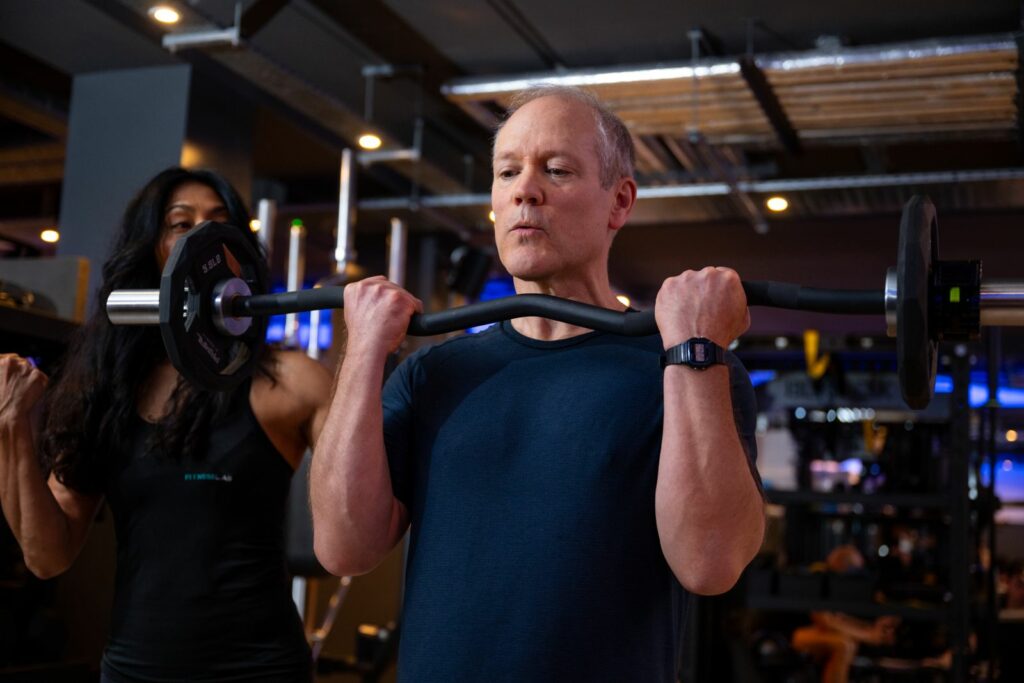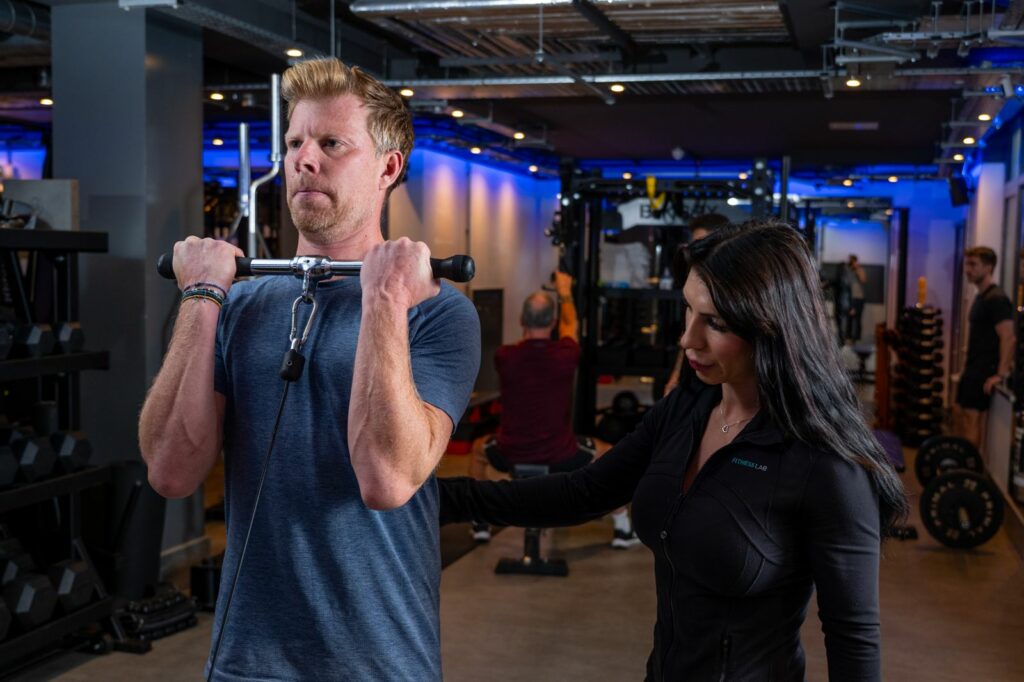Whether you discuss weight loss with friends or look at the broad range of info available online – you’re likely to hear a dozen different opinions about how to lose weight. Some of them will sound reasonable, some of them will sound extreme, and many will contradict each other. It’s little wonder people get frustrated by losing body fat – often before they’ve even taken the first steps.
This feeling of being stuck before you really get started is something we see a lot – and it’s often because people have advice in their heads that has never been supported by real science. So, we felt it useful to take a look at some of those ideas – and explain how they compare to what’s actually going on inside the body. When you understand the principles, your decisions become calmer, simpler and far more effective.
Let’s look at some of the often-repeated fat loss myths:
Myth 1: You need to follow a crash diet to make real progress
Crash diets feel powerful. You cut calories hard, you see the scales drop quickly and it appears to be working. The problem is that the body reads extreme restriction as a threat. Your energy levels fall, your hunger hormones jump and your metabolic rate slows. You might lose weight in the short term, but you also lose a lot of lean tissue along the way.
Once your body has fought back for long enough, you hit the wall. The diet collapses and your old patterns return. This is why crash diets nearly always lead to rebound weight gain.
The truth: Sustainable fat loss comes from a small, steady calorie deficit that you can stick to without white knuckling your way through each day. Most people do better with moderate structure and a plan that leaves room for normal life. Strength training supports your metabolism and helps protect muscle, which is key for long-term weight control. Small, repeatable choices always beat dramatic gestures.

Myth 2: You must eat “clean” or perfectly
A lot of people think weight loss requires saint-like discipline around food. The moment something “off plan” slips in, they feel as if they have ruined everything. That belief creates cycles of restriction followed by overeating, because once people feel they have failed, the temptation is to give up entirely.
The truth: Fat loss is governed by total energy balance, not moral perfection. You can enjoy meals out, chocolate, wine or whatever you like as long as the overall pattern stays in control. A good coach helps you build flexible habits rather than rigid rules. When food becomes less emotional, everything becomes easier.
Myth 3: You need to train like an athlete
Another common belief is that you must commit to huge amounts of exercise. Daily HIIT sessions. Endless cardio. Two hour daily strength workouts. This is rarely sustainable if you have a job, a family or any real life commitments. It also leads to burnout and injuries.
The truth: You do not need heroic training volumes to lose fat. Two or three sensible gym sessions per week is enough for most people. Build strength, move regularly, get outside when you can and keep the intensity appropriate for your ability. Training should fit your life, not the other way around. Your body responds best when you are consistent, not exhausted.

Myth 4: Cardio is the only way to lose fat
Long runs and sweaty spin classes have their place, but relying on cardio alone is one of the reasons many people get stuck. You burn calories during the session, but that is about it. Once you stop, the effect ends.
The truth: Strength training is the more powerful long term tool. Lean muscle acts like a metabolic engine. The more of it you build, the more efficiently your body burns energy all day. In fact, we’ve put an entire blog together on this subject alone – you can read Why Strength Traning Beats Cardio for Fat Loss if you’d like a deeper dive into the science.
Do we hate cardio? Absolutely not. Cardio supports heart health, improves mood and adds to your overall calorie burn, but it works best when combined with resistance training and a modest calorie deficit. In other words, you do not need hours of cardio to change your body. You need a balanced approach.
Myth 5: Some people have a “natural” weight they can never move away from
This is one of the myths that sounds almost comforting. It lets people believe that their current weight is simply their destiny. In health circles, this is known as ‘set point’ theory. Genetics do influence things like appetite, metabolism and how easily someone gains muscle or fat. But the idea that your body has a fixed number that it will always snap back to is misleading.
The truth: Most people can make meaningful, long-lasting changes with the right strategy. What tends to hold people back is not biology; it is trying the same unsustainable methods over and over again. When you adjust your training, nutrition and habits to match real life, the body adapts. You are far less constrained by genetics than you might think.
Myth 6: GLP-1 medications automatically destroy muscle
Drugs like Ozempic and Wegovy have changed the conversation around weight loss. They reduce appetite so effectively that many people lose weight quickly. That rapid drop can include muscle loss, which understandably worries people.
The truth: Muscle loss is possible, but not inevitable. When weight comes off very fast, the body loses both fat and lean tissue unless you intervene. The solution is simple and understood by medical professionals. Eat enough protein, lift weights two or three times per week and avoid pushing calories so low that your body cannot maintain muscle. People on GLP-1 medications who follow a structured strength programme have preserved muscle far better than those who rely on the medication alone.
The medication is a tool, not a substitute for healthy habits. When paired with training and good nutrition, it can help people change their bodies without sacrificing the very tissue that keeps them strong, energetic and metabolically healthy.

Myth 7: Age makes weight gain inevitable
There is a common belief that once you hit a certain age, your body simply decides to get heavier no matter what you do. For women, this often gets blamed on perimenopause or menopause. For men, it is usually chalked up to falling testosterone levels or a “middle-aged metabolism”. The message is the same either way: you are not really in control anymore.
The truth: Ageing does change the landscape, but it does not lock your body into weight gain. Most people become a little less active as the years pass. Sleep can take a hit. Stress piles up. Strength levels drop if you are not training consistently. Put all of that together and it is easy to see why fat gain becomes more common. But these are modifiable factors, not fate.
For women, hormonal shifts can influence where fat is stored, how hungry you feel and how refreshed you feel after sleeping. For men, gradual drops in testosterone can affect energy, motivation and muscle retention. None of this makes fat loss impossible. It just means the strategy might need to evolve – which a good coach will understand.
Strength training also becomes more important with age because it protects muscle and keeps your metabolism healthier. Protein needs tend to increase. Recovery matters more, which makes good sleep and sensible training essential. With those pieces in place, people in their 40s, 50s and 60s often make some of the best progress of their lives.
In short? Age sets the context, not the outcome. Your body remains responsive, adaptable and fully capable of change when the plan supports it.
Myth 8: You need to feel hungry all the time
Many people believe that hunger is a sign the plan is working. This mindset leads them to ignore their own signals and push through unnecessary discomfort. The message on this one is clear however – chronic hunger is the quickest route to binge eating and quitting altogether.
The truth: Your plan should leave you feeling satisfied most of the time. Higher protein meals, plenty of fibre, regular meal timing and enough hydration all help manage appetite. Managing hunger is not cheating. It is good strategy.
The bigger picture
Honestly, these myths survive – and will continue to be discussed – because they contain a grain of truth. However, you’ll find that they crumble when you look at the bigger picture. Sustainable fat loss is not dramatic – it’s deliberate. It comes from building strength, being consistent with daily habits, and creating an environment where your body feels supported, rather than threatened.
At Fitness Lab, we create weight loss programmes that you can live with. No punishments, no shortcuts, and no wisdom built on thin anecdotal evidence – just a clear, personalised roadmap that helps you lose weight without losing muscle, confidence, your temper, or your social life!
If you’d like a conversation about how this could look for you – a free, unrushed consultation is a great next step. Complete the form at the bottom of this page, and we’ll handle the rest.

